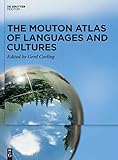The Mouton Atlas of Languages and Cultures. Volume 1, The Mouton Atlas of Languages and Cultures, 1 / ed. by Gerd Carling.
Material type: TextSeries: The Mouton Atlas of Languages and Cultures ; Volume 1Publisher: Berlin ; Boston : De Gruyter Mouton, [2019]Copyright date: ©2019Description: 1 online resource (XXXII, 728 p.) : Ca. 150 KtnContent type:
TextSeries: The Mouton Atlas of Languages and Cultures ; Volume 1Publisher: Berlin ; Boston : De Gruyter Mouton, [2019]Copyright date: ©2019Description: 1 online resource (XXXII, 728 p.) : Ca. 150 KtnContent type: - 9783110373073
- 9783110393330
- 9783110367416
- 410 23/eng/20230216
- online - DeGruyter
- Issued also in print.
| Item type | Current library | Call number | URL | Status | Notes | Barcode | |
|---|---|---|---|---|---|---|---|
 eBook
eBook
|
Biblioteca "Angelicum" Pont. Univ. S.Tommaso d'Aquino Nuvola online | online - DeGruyter (Browse shelf(Opens below)) | Online access | Not for loan (Accesso limitato) | Accesso per gli utenti autorizzati / Access for authorized users | (dgr)9783110367416 |
Browsing Biblioteca "Angelicum" Pont. Univ. S.Tommaso d'Aquino shelves, Shelving location: Nuvola online Close shelf browser (Hides shelf browser)
Frontmatter -- Preface -- Contributors -- Funding and support -- Abbreviations -- Orthographic conventions for Caucasian languages -- Overview of conventions -- Overview of tables -- Overview of figures -- Overview of maps -- Overview of appendices -- Contents -- 1. Introduction -- 2. Theoretical backdrop: words, things, and humans in their environment -- 3. Language: classification, reconstruction, and principles of change -- 4. Description of the database Diachronic Atlas of Comparative Linguistics -- 5. Atlas: Grammar -- 6. Atlas: Lexicon -- 7. Concluding chapter: an integrated view of the linguistic and cultural histories of Eurasia -- Literature -- Appendix 1: Languages of the current atlas -- Appendix 2a: Grammar: Features, complete list (from DiACL) -- Appendix 2b: Grammar: State combinations -- Appendix 2c: Grammar: State combinations in languages -- Appendix 2d: Grammar: Solutions 1–10 by Structure -- Appendix 3a: Lexicon: list of concepts, coverage by family -- Appendix 3b: Lexical data -- Appendix 3c: Lexical data: statistics -- Appendix 3d: Lexicon: Source language data, flow map -- Appendix 4a: Language consultants -- Appendix 4b: Literary sources -- Appendix 4c: Geographical sources -- Map Credits -- Index
restricted access online access with authorization star
http://purl.org/coar/access_right/c_16ec
The notion of cultural aspects of language variation and change is a growing field. However, collective works on the current stance within this domain are still scarce. The Mouton Atlas of Languages and Cultures embraces a substantial part of the Eurasian continent and equips the reader to better observe, reconstruct and understand the impact of culture and cultural changes on language diversity and linguistic developments. Along the way, a fascinating range of interdisciplinary issues, from database encoding conventions to etymologies and cultural anthropology, are discussed. Based on an extensive database assembled by Gerd Carling and her team in Lund, Sweden, the atlas presents typological and lexical data of more than 200 ancient and modern languages, many encoded for the very first time. Alongside classic maps, the atlas features new visualizations, such as polygons and network diagrams, which smartly illustrate complex linguistic patterns of borrowability, co-lexification and semantic evolution and thereby provide entirely new perspectives. In collaboration with Acherdan Abregov, Elnur Aliyev, Leila Avidzba, Chundra Cathcart, Merab Chukhua, Sandra Cronhamn, Robert Farren, Johan Frid, Anne Goergens, Josine Greidanus, Teimuraz Gvantseladze, Harald Hammarström, Arthur Holmer, Niklas Johansson, Madzhid Khalilov, Edin Kuckovic, Filip Larsson, Tamar Lomadze, Mikael Novén, Ante Petrović, Erich Round, Revaz Tchantouria, Maka Tetradze, Larisa Tuptsokova, Karina Vamling, Briana Van Epps, Rob Verhoeven, Ola Wikander, Astrid Zimmermann. DiACL - Diachronic Atlas of Comparative Linguistics https://snd.gu.se/en/catalogue/study/ext0269 https://diacl.ht.lu.se/
Issued also in print.
Mode of access: Internet via World Wide Web.
In English.
Description based on online resource; title from PDF title page (publisher's Web site, viewed 25. Jun 2024)









